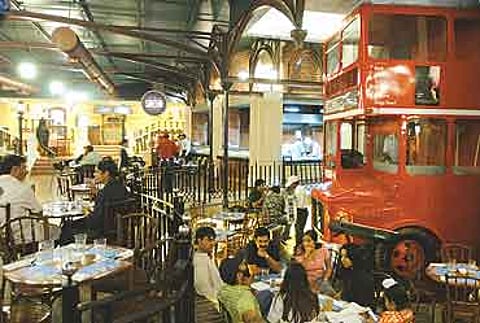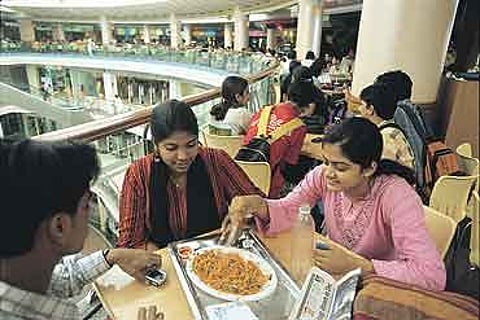All malls to be, therefore, will likely have these food plazas. They will be there in almost all the 25 malls of the dlf group slated to come up in 11 cities. Other players like Suncity Projects and Parsvnath Builders, too, are taking extra care in designing their food courts.
They ought to, since with so many options on the gourmet radar, the customer is bound to get spoilt for choice. Builders, therefore, are going overboard in giving that extra something to the food courts they are providing. The DT Diner has live musical performances every evening as well as non-food attractions like a book shop, cookie and candy counters and a huge HDTV screen. The food court at R Mall, Mulund, Mumbai, goes for the hard stuff. They have Pop Tates, a popular kiosk serving alcohol. And the Dosa Plaza here serves 104 varieties of dosa. The live DJ and band come free.
Cut to the capital and you arrive at Piccadelhi, a month-old food court in Connaught Place that attempts to recreate the ambience of London's famous Piccadilly Circus. From a statue of John Lennon, a DJ console shaped like the front of a London bus, pizzas baked fresh from an imported firewood oven to economic chaat combos, the food court manages to tickle your palate as well as impress your mind.
Some like ABC Farms, Koregaon Park, Pune, dare to be different by shunning regular fare like your dosa, tandoori, Chinese and chaat, and offer typical Continental fare like smoked veal or Okonomiyaki (a Japanese pancake), a hard-core Japanese number. "Exposure to global living has started to reflect in the food preferences of our customers and we have to catch up with that," says owner Sohrab Chinoy.
Medley Of Taste
Chaat, pizza, coffee, biriyani—one roof fits all. Food courts are reshaping the business of eating out.


Back on the roads, it's the highways that have taken to improving the food court culture. The pit stops that state tourism buses normally used to halt at for some refreshments are now out of the loop. The Delhi-Dehradun, Delhi-Karnal, Delhi-Jaipur and Pune-Mumbai expressways have food courts to beat away the travel fatigue with a piping hot dosa or a spicy chaat. Chibba estimates there must be more food courts on highways than in all the state capitals.
Food courts are making sound business sense for retailers, too. A small breakeven period, six months to a year compared to the three-six years for a restaurant, no marketing costs and a larger clientele make food courts lucrative places to have a joint in. The only drawbacks are the fixed costs like the rental, equipment and maintenance. The rental charged for a 100 sq feet area of a food court is equivalent to one charged for a 250 sq feet area because of super area loading.
Be that as it may, food courts offer great goings for the foodies and retailers. And with India poised as the fifth largest retail destination in the world, the food court appetite is only going to grow.
Tags